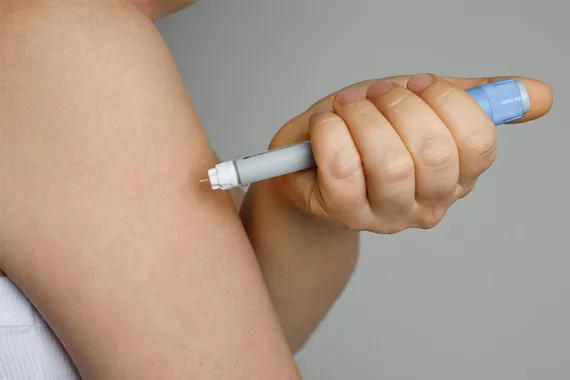
Case Overview
Tirzepatide deaths can result from drug complications, including serious stomach problems, gallbladder problems, kidney failure, pancreatitis and thyroid cancer. Tirzepatide is the active ingredient in Mounjaro® and Zepbound®. Eli Lilly manufactures and sells these two popular medications.
Key takeaways about tirzepatide deaths
- Tirzepatide is the active ingredient in Mounjaro and Zepbound. These two GIP/GLP-1 RA medications are used to treat type 2 diabetes and encourage weight loss.
- Tirzepatide and other GLP-1 RA drugs may cause severe and potentially fatal side effects.
- Plaintiffs and the families of injured loved ones are suing Eli Lilly for injuries and deaths caused by tirzepatide medications. Tirzepatide lawsuits claim the drug company knew about dangerous side effects and did not adequately warn consumers.
What is tirzepatide?
Tirzepatide is a glucose-dependent insulinotropic polypeptide (GIP) and glucagon-like peptide-1 (GLP-1) receptor agonist (RA) drug. It is used to treat type 2 diabetes and obesity.
Tirzepatide and other GLP-1 RA drugs may cause severe and deadly side effects, including serious gastrointestinal problems, kidney failure, gallbladder problems and thyroid cancer.
What are the risks of tirzepatide?
Tirzepatide risks include severe gastrointestinal problems, kidney failure and pancreatitis. Mounjaro® and Zepbound® warning labels also include thyroid cancer, gallbladder disease, vision changes, hypoglycemia and severe allergic reactions.
Patients who have taken tirzepatide and other GIP/GLP-1 RA drugs, including semaglutide, have developed life-altering and fatal health problems. The U.S. Food & Drug Administration (FDA) has an adverse event reporting system (FAERS) database. In 2022 and 2023, FAERS received 49 death reports, 34 life-threatening reports and 24 disability reports for tirzepatide. FAERS is intended to help identify safety concerns related to marketed products, but it does not prove any product or drug is linked or caused a particular side effect or injury.
Potentially fatal conditions associated with tirzepatide include thyroid tumors and thyroid cancer, acute kidney injury and gastroparesis (stomach paralysis). Contact your healthcare provider immediately if you take tirzepatide or another GIP/GLP-1 RA and experience side effects, including:
- Changes in vision
- Diarrhea, nausea and vomiting
- Difficulty breathing
- Difficulty swallowing
- Dizziness or lightheadedness
- Jaundice (yellowing of the skin or eyes)
- Lump or swelling in the neck
- Rapid heartbeat
- Rash or swelling of the face, lips, tongue or throat
- Severe stomach pain
Tirzepatide severe side effects and complications
Some patients who use tirzepatide may experience severe side effects or adverse health reactions.
Diabetic retinopathy
Labels for Zepbound and Mounjaro list diabetic retinopathy under Warnings and Precautions. The labels advise patients to contact their doctors if they experience any changes in vision.
Diabetic retinopathy is caused by abnormal blood vessel growth in the eye. The condition can cause hemorrhages in the eye, retinal detachment, glaucoma and blindness. Studies also connect diabetic retinopathy with an increased risk of death from cardiovascular disease in patients with diabetes.
Gallbladder disease
Tirzepatide and other GLP-1 drugs delay gallbladder emptying. Studies link the use of these medications to a significant increase in the risk of gallbladder disease. Symptoms of gallbladder disease include:
- Chills
- Fever
- Gallbladder inflammation (acute cholecystitis)
- Nausea
- Pain in the abdomen, back, breastbone or under the shoulder blades
- Vomiting
Gallbladder disease can also lead to gallstones and blockages developing in the intestines or bile ducts, which transport waste. Gallstones and blockages can cause perforations (holes) in the gallbladder, infections and pancreatitis. All of these complications can be fatal.
Gastrointestinal adverse reactions
Tirzepatide, semaglutide and other GLP-1 medications may cause severe gastrointestinal adverse reactions. A permanent, life-altering and potentially fatal condition called gastroparesis is linked with these drugs. As early as 2011, studies have linked severe stomach and intestinal problems to GLP-1RAs.
Gastroparesis is a condition that slows normal muscle movement in the stomach, preventing the stomach from properly emptying. Delayed stomach emptying can interfere with digestion and cause side effects that can significantly alter a patient’s quality of life. There is no cure for gastroparesis.
Those with gastroparesis may experience:
- Abdominal bloating
- Abdominal pain
- Acid reflux
- Malnutrition
- Nausea
- Severe dehydration
- Vomiting
Gastroparesis may also lead to a hardened mass of undigested food developing in the stomach. The food mass can cause life-threatening blockages and obstructions. The American Society of Anesthesiologists also warns that delayed stomach emptying increases the risk of vomiting and aspiration happening during surgery. The society advises patients taking GLP-1 RAs to stop using the drugs at least a week before scheduled procedures.
The labels for Zepbound and Mounjaro don’t warn about gastroparesis. Instead, the labels briefly mention delayed gastric emptying under Drug Interactions.
Hypersensitivity reactions
Hypersensitivity reactions happen when the body has an extreme immune response to a substance. Signs of a hypersensitivity reaction include:
- Hives
- Loss of consciousness
- Nausea and vomiting
- Rash
- Shortness of breath
- Stomach cramps
- Wheezing
Tirzepatide drug labels warn against hypersensitivity reactions, including anaphylaxis and angioedema.
Anaphylaxis is a severe and life-threatening allergic reaction. It occurs when the immune system releases a flood of chemicals that can cause blood pressure to drop and the body to go into shock. You must treat anaphylaxis with an injection of epinephrine, or the condition can be fatal.
Angioedema is similar to hives, but swelling occurs under the skin rather than on the surface. Angioedema can cause swelling of the eyes and mouth, stomach cramps and difficulty breathing. The condition can lead to a severe, potentially fatal blockage of the airways.
Hypoglycemia
Hypoglycemia, or low blood sugar, is common in people with diabetes. It is also a condition listed under Warnings and Precautions of tirzepatide drug labels.
Patients should seek treatment for hypoglycemia symptoms immediately by eating or drinking carbohydrates. If not treated, severe hypoglycemia can result in a coma or death.
Signs of hypoglycemia can develop quickly and may include:
- Blurred or double vision
- Chills
- Confusion
- Disorientation
- Dizziness
- Increased heart rate
- Loss of consciousness
- Seizures
- Shaking or trembling
- Slurred speech
- Sweating
- Weakness
Kidney injury
Tirzepatide side effects, like vomiting and diarrhea, may result in severe dehydration. Dehydration can lead to kidney injuries, including kidney failure.
An acute kidney injury (AKI), formerly called acute renal failure (AKF), happens when the body suddenly is unable to filter waste from your blood. If not treated, it can lead to chronic kidney disease and affect other organs, like the heart, lungs and brain. Without dialysis or a kidney transplant, kidney failure results in death.
Signs of AKI include:
- Chest pain or pressure
- Confusion
- Decreased appetite
- Decreased urine output
- Fatigue
- High blood pressure
- Nausea
- Pain in either side of the back between the ribs and hips
- Seizure or coma
- Swelling in the legs, ankles or feet
Pancreatitis
Pancreatitis is another condition included in the Warnings and Precautions for tirzepatide. The label states that pancreatitis has been reported in clinical trials of the drug.
Pancreatitis is inflammation of the pancreas. The condition can cause severe and deadly complications, including:
- Breathing problems
- Infection
- Kidney failure
- Malnutrition
- Pancreatic cancer
- Pseudocyst (fluid and debris build-up in a “pocket” of the pancreas that can rupture, causing internal bleeding and infection)
Lawsuits allege that people taking GLP-1 RAs like tirzepatide may be at risk of developing necrotizing pancreatitis. Necrotizing pancreatitis is a condition in which the tissue of the pancreas may die due to severe inflammation. There is a high mortality risk for patients diagnosed with necrotizing pancreatitis.
Suicidal behavior and ideation
In 2023, the U.S. Food and Drug Administration (FDA) announced that it was evaluating a potential link between suicidal ideation and GLP-1 RA drugs. The agency was looking at Zepbound, Mounjaro, Ozempic, Wegovy, Trulicity®, Victoza® and Saxenda®. The FDA continues to receive and review reports of suicidal thoughts and ideations from GLP-1 RA users and their families.
Zepbound’s label lists suicidal ideation as a side effect. Mounjaro’s label does not.
Severe tirzepatide side effects lead to lawsuits
Plaintiffs and the families of injured loved ones are seeking compensation for injuries and deaths caused by tirzepatide and other GLP-1 RAs. Tirzepatide lawsuits state that Eli Lilly knew about the severe side effects of these drugs, including gastrointestinal issues but they didn’t warn the public or the doctors who prescribe the drug about the side effects.
Drug manufacturer Novo Nordisk faces similar personal injury claims over its GLP-1 RA drugs, including Ozempic® and Wegovy®. Both drugs use the active ingredient semaglutide. Despite ongoing litigation, Eli Lilly and Novo Nordisk continue to make, market and sell the drugs to patients and physicians without providing adequate warnings.
Lawsuits against Eli Lilly and Novo Nordisk are being consolidated into multidistrict litigation (MDL) in the U.S. District Court for the Eastern District of Pennsylvania. As of September 2024, the MDL includes more than 800 claims, but some lawyers expect to see more than 10,000 cases filed.
Motley Rice is representing plaintiffs in the MDL. If GIP/GLP-1 RA medications harmed you or someone you love, Motley Rice can tell you more about your legal options regarding filing a weight loss or diabetes lawsuit.
Frequently asked questions about tirzepatide
Can tirzepatide cause stroke?
Some side effects of tirzepatide, like hypoglycemia and diabetic retinopathy, may increase a patient’s risk of a stroke. However, some studies show that tirzepatide can decrease the risk of a Major Adverse Cardiac Event (MACE), including stroke and heart attack.
Is tirzepatide bad for kidneys?
Tirzepatide may negatively affect a patient’s kidneys. The medication can cause kidney problems and kidney failure. Diarrhea, vomiting and other side effects of Zepbound and Mounjaro can cause severe dehydration, leading to acute kidney injury (AKI).
How does tirzepatide affect the brain?
Tirzepatide may affect the brain by causing irritability, agitation and abnormal behaviors. Some tirzepatide users experience depression and suicidal thoughts and ideations.
Speak with your doctor if you experience sudden and strong feelings, including nervousness, anger, restlessness and fear while taking tirzepatide. Some tirzepatide users may also have violent thoughts and feelings.
Our medical drug litigation experience
Our medical attorneys have represented thousands of patients seriously hurt by dangerous prescription and over-the-counter drugs. We understand that as a patient or family member, what you know about your or a loved one’s medications may be limited.
If you believe a medicine made you sick or hurt you, our attorneys have the resources needed to investigate thoroughly and:
- Identify potentially harmful medicines
- Investigate if the medicine hurt you
- Review the medicine manufacturer’s compliance with FDA regulations
- Review the adequacy of the manufacturer's warning to you about potential side effects
- Recognize other issues that could affect your potential claim
Learn more about our medical drug experience here.
Do not stop taking a prescribed medication without first consulting with your doctor.
Discontinuing a prescribed medication without your doctor's advice can result in injury or death. Zepbound, Mounjaro, Ozempic, Wegovy, Trulicity, Victoza and Saxenda remain approved by the U.S. Food and Drug Administration.
Key takeaways
What is tirzepatide?
What are the risks of tirzepatide?
Tirzepatide severe side effects and complications
Severe tirzepatide side effects lead to lawsuits
Frequently asked questions about tirzepatide
Our medical drug litigation experience
- Sources
- Barrot, J., Real, J., Vlacho, B., Simó, R., Mauricio, D., & Castelblanco, E. Diabetic retinopathy as a predictor of cardiovascular morbidity and mortality in subjects with type 2 diabetes. Frontiers in Medicine. 2022 Aug 15; 9:945245.
- Cho YK, La Lee Y, Jung CH. The Cardiovascular Effect of Tirzepatide: A Glucagon-Like Peptide-1 and Glucose-Dependent Insulinotropic Polypeptide Dual Agonist. J Lipid Atheroscler. 2023 Sep;12(3)
- Cleveland Clinic. Hypoglycemia (Low Blood Sugar).
- Cleveland Clinic. Kidney Failure.
- Eli Lilly. Tirzepatide.
- Farzam K, Patel P. Tirzepatide. StatPearls Publishing. 2024 Jan.
- He L, Wang J, Ping F, et al. Association of Glucagon-Like Peptide-1 Receptor Agonist Use With Risk of Gallbladder and Biliary Diseases: A Systematic Review and Meta-analysis of Randomized Clinical Trials. JAMA Intern Med. 2022 March 28;182(5).
- Liu L. A real-world data analysis of tirzepatide in the FDA adverse event reporting system (FAERS) database. Front Pharmacol. 2024 Jun 7;15:1397029.
- Mayo Clinic. Anaphylaxis.
- Mayo Clinic. Diabetic retinopathy.
- Mayo Clinic. Pancreatitis.
- Mayo Clinic. Tirzepatide (Subcutaneous Route).
- Medical News Today. What to know about the different types of hypersensitivity reactions.
- Mount Sinai. Gallstones and gallbladder disease.
- National Kidney Foundation. Acute Kidney Injury (AKI).
- PennMedicine. What is Angioedema?
- Reuters. Ozempic litigation's new judge steps into big battle.
- Smith L, Chakraborty D, Bhattacharya P, Sarmah D, Koch S, Dave KR. Exposure to hypoglycemia and risk of stroke. Ann N Y Acad Sci. 2018 Nov;1431(1):25-34.
- United States District Court Eastern District of Pennsylvania. MDL 3094 In Re: Glucagon-like Peptide-1 Receptor Agonists (GLP-1 RAS) Products Liability Litigation.
- United States Judicial Panel on Multidistrict Litigation. MDL Statistics Report - Distribution of Pending MDL Dockets by Actions Pending.
- U.S. Food & Drug Administration. July - September 2023 | Potential Signals of Serious Risks/New Safety Information Identified by the FDA Adverse Event Reporting System (FAERS).
- U.S. Food & Drug Administration. Mounjaro label.
- U.S. Food & Drug Administration. Update on FDA’s ongoing evaluation of reports of suicidal thoughts or actions in patients taking a certain type of medicines approved for type 2 diabetes and obesity.
- U.S. Food & Drug Administration. Zepbound label.


